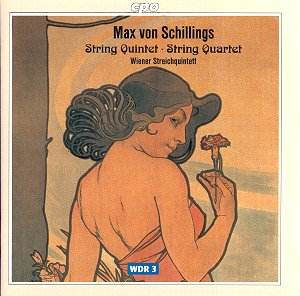The String Quartet in E minor is the work of a brilliant
19-year-old from a well-off and cultured family who had swallowed Wagner
whole after a youthful exposure to Parsifal at Bayreuth. Though
recorded here in the revision of 1906, it reveals that already the composer
was a talented composer in the mainstream of German music. The coupling,
the Quintet in E flat major, is his last extended work and was written
thirty years later after the success of von Schillings’ celebrated opera
Mona Lisa during the First World War. In his extensive and valuable
booklet notes Eckhardt van den Hoogen (elegantly and amusingly written
though occasionally stilted in translation) points out parallels here
with the music of Korngold, underlining it to be music of its time and
closely identifying with the Austro-German tradition.
Both scores are engaging from beginning to end, though
I preferred the earlier work. The young von Schillings is wonderfully
fluent and the soaring first movement of the Quartet is driven by an
invigorating youthful ardour which is immediately compelling, a most
enjoyable discovery. Von Schillings became known as an opera composer
and conductor, as well as for a variety of orchestral works, several
of which have re-surfaced on CD, notably from CPO. Notable among these
are the Glockenlieder, the Violin Concerto and the melodrama
Das Hexenlied.
Von Schillings died in July 1933 although as a composer
he ran out of steam by the end of the First World War. In the days of
acoustic 78s he recorded orchestral interludes from his operas and the
melodrama Das Hexenlied and in his last years later repeated
the exercise using the electrical process (von Schillings’s electrical
78s are reissued on Preiser MONO 90294, fascinating for the voice of
Ludwig Wüllner, the tenor soloist in Elgar’s Gerontius at
Düsseldorf in 1901 and 1902 and London in 1903).
The notes remind us that the composer had a somewhat
combative temperament, constantly finding musical quarrels and imagined
plots to become involved in. He soon developed anti-semitic sentiments
and we do need to remind ourselves that at the very end of his life
he became President of the Prussian Academy of the Arts after the Nazi
assumption of power, in which capacity in the last month of his life
he signed the authorities dismissing various leading Jewish musicians
from their posts, including Schönberg and Schreker.
These are gorgeous performances finely caught - if
only all recordings of unknown chamber music could be so well done.
If you want to explore von Schillings or the German music of his period
you should not hesitate.
Lewis Foreman

![]() Wiener String Quartet
Wiener String Quartet ![]() CPO 999 608-2 [73.14]
Midprice
CPO 999 608-2 [73.14]
Midprice